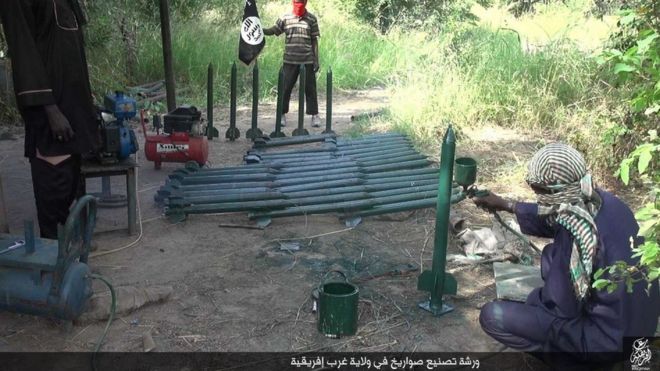Boko Haram, the Islamist terrorist group in Nigeria with links to Daesh, recently published photos of its militants making rockets and other weaponry in Norther Nigeria. Previously, Boko Haram had largely relied on taking government weapons to sustain its fight, but the new images raise questions about its sophistication. Those this weaponry is crude by any standard, it still would allow Boko Haram to fight back against the government advances and continue its deadly insurgency.
The implications for the broader fight against global terrorism are minimal but nonetheless concerning. This weaponry could be transported across porous borders to other groups, such as Al Qaeda in the Islamic Maghreb or Ansar Dine, who operate in Northern Mali and neighboring Niger. Such trade in weaponry could allow these groups, who have were routed by French and AU forces in 2013, to regroup and recommence insurgency warfare in earnest. Daesh has proven that crude weaponry can be lethal on the population due to its manufacturing of chemical weapons. Though the weaponry is not comparable to the technology seen by Daesh, this gives credence to the suspicion that Boko Haram is communicating with IS.
This also means the insurgency in Nigeria will be more difficult to passively contain through sanctions. Robust training and equipping of regional forces are increasingly necessary to degrade Boko Haram. This means a weapons embargo by the United States on Nigeria's military might need to be lifted, at least in part, to permit Nigeria to purchase more advanced weapons. In addition, if Daesh and Boko Haram are communicating, it has greater implications for the extent of Daesh's influence. Further adding to this likelihood is the fact that Sudan arrested a Boko Haram terrorist in Khartoum. He is suspected of being the mastermind of a blast in Abuja that killed 75 and injured 200. Was this individual crossing from the Middle East, specifically the Sinai peninsula or Syria? If so, it would be the first solid evidence of direct interaction between the two groups and would have greater implications for defeating the global Daesh terror network.

No comments:
Post a Comment